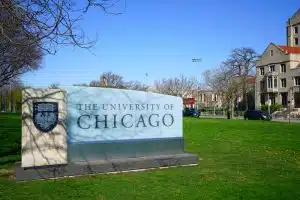Cornell vs Colby: A Comprehensive Analysis
If you are considering attending college, it is important to research and compare multiple universities to find the best fit for your academic and personal goals. Two great universities to consider are Cornell and Colby. In this comprehensive analysis of Cornell vs Colby, we will compare all aspects of these two prestigious institutions to help you make an informed decision.
Introduction to Cornell University and Colby College
Cornell University is a private Ivy League research university in Ithaca, New York. It was founded in 1865 by Ezra Cornell and Andrew Dickson White. With 15 colleges and schools, Cornell offers over 4,000 courses and over 70 undergraduate majors.
Colby College is a private liberal arts college located in Waterville, Maine. Founded in 1813, it is one of the oldest independent liberal arts colleges in the country, offering 58 majors and minors in a range of fields.
Both Cornell and Colby have a strong commitment to research and innovation. Cornell has numerous research centers and institutes, including the Cornell Lab of Ornithology and the Cornell Center for Materials Research.
On the other hand, Colby has a strong focus on interdisciplinary research and offers students the opportunity to participate in research projects across various fields, from environmental studies to neuroscience.
History of Cornell and Colby
As mentioned above, Cornell University was founded in 1865 by Ezra Cornell and Andrew Dickson White. The university was founded as a nonsectarian institution to provide an education for all who wished to pursue it.
Similarly, Colby College was founded in 1813 by a group of Waterville citizens who wanted to establish a Baptist institution of higher learning. The college has since become nondenominational but still has a strong commitment to the liberal arts and the advancement of knowledge.
Cornell and Colby are strongly committed to research and innovation despite their different founding histories. Cornell is known for its groundbreaking research in fields such as agriculture, engineering, and veterinary medicine, while Colby strongly focuses on environmental studies and sustainability.
Both institutions have produced numerous notable alumni, including Nobel laureates, Pulitzer Prize winners, and prominent business leaders.
Location and Campus Infrastructure of Cornell vs Colby
Cornell University is located in Ithaca, New York, in the Finger Lakes region of upstate New York. The campus covers over 2,300 acres of land and includes over 260 buildings.
Meanwhile, Colby College is located in Waterville, Maine, about an hour north of Portland. The campus spans over 714 acres of land and features modern and historic buildings which blend with the natural surroundings.
Cornell University is a member of the Ivy League and is one of the most prestigious universities in the United States. The university has a diverse student body, with students from all 50 states and over 120 countries.
The campus is also home to several research centers and institutes, including the Cornell Lab of Ornithology and the Cornell Center for Astrophysics and Planetary Science.
Colby College is a liberal arts college known for its strong academic programs and commitment to sustainability. The college has a student-to-faculty ratio of 10:1, which allows for personalized attention and mentorship.
The campus is also home to several unique features, including the Colby College Museum of Art and the Colby Organic Garden, which provides fresh produce for the college’s dining halls.
Admission Criteria of Cornell vs Colby
Admission to Cornell University is highly competitive, with an acceptance rate of 9%. The university looks for students with academic achievement, extracurricular involvement, and unique talents or experiences.
Colby College has a similarly competitive admissions process, with the same acceptance rate of 9%. The college seeks students who demonstrate academic excellence, personal integrity, and a desire to contribute to society.
Both Cornell and Colby also consider standardized test scores, such as the SAT or ACT, as part of their admissions process. However, they both have a test-optional policy, which means that students can choose only to submit their test scores if they accurately reflect their academic abilities.
Additionally, both institutions value diversity and actively seek to admit students from various backgrounds and experiences.
Student Life at Cornell vs Colby
Both Cornell and Colby offer students rich and diverse campus life experiences. Cornell has over 500 student-led organizations, including academic and professional societies, cultural groups, and athletic clubs. Colby College has over 100 student organizations, including student government, academic clubs, and service organizations.
Both institutions emphasize community engagement, intellectual curiosity, and personal growth outside the classroom.
Additionally, Cornell and Colby offer a variety of on-campus events and activities throughout the year. Cornell hosts an annual Slope Day celebration, a day-long festival featuring live music, food, and games.
Colby College hosts a Winter Carnival each year, which includes ice skating, snowshoeing, and other winter activities. These events allow students to socialize and connect with their peers outside the classroom.
Furthermore, both schools have strong athletic programs and offer a range of intramural and club sports. Cornell is a member of the Ivy League and has 36 varsity sports teams, while Colby College is a member of the New England Small College Athletic Conference and has 32 varsity sports teams.
Students can also participate in club sports such as ultimate frisbee, rugby, and equestrian. These athletic opportunities allow students to stay active and build camaraderie with their teammates.
Academic Programs Offered by Cornell vs Colby
Cornell and Colby offer students various academic programs in various fields. At Cornell, students can earn degrees in agriculture and life sciences, architecture, art, engineering, hotel administration, human ecology, industrial and labor relations, and liberal arts and sciences.
Colby College offers degrees in anthropology, art, biology, chemistry, computer science, economics, English, environmental studies, and more. Cornell and Colby have strong academic reputations and offer students the opportunity to pursue their passions and develop their skills.
In addition to the undergraduate programs, both Cornell and Colby offer graduate programs in various fields. Cornell offers graduate programs in fields such as business, law, medicine, engineering, and more.
Meanwhile, Colby College offers graduate programs in education, environmental studies, and global studies. These graduate programs provide students with advanced knowledge and skills in their chosen fields and prepare them for successful careers in their respective industries.
Faculty and Teaching Quality at Cornell vs Colby
Cornell and Colby are committed to providing their students with world-class faculty members who are experts in their fields. Both schools offer small class sizes and encourage students to work closely with their professors.
Cornell has over 1,600 faculty members, while Colby has a faculty of approximately 200. They have also received numerous awards and recognitions for their teaching quality.
In addition to their commitment to hiring top-notch faculty, Cornell and Colby also prioritize ongoing professional development for their professors.
Both schools offer opportunities for faculty members to attend conferences, workshops, and other training sessions to stay up-to-date on the latest research and teaching methods in their fields.
Furthermore, Cornell and Colby have robust programs to support their faculty members in their research endeavors. From funding research projects to offering assistance with grant applications, these universities are dedicated to helping their faculty members succeed both in and out of the classroom.
Research Opportunities at Cornell vs Colby
Cornell and Colby both encourage their students to engage in research and scholarship. Cornell has over 100 research centers and institutes, offering students opportunities to work with cutting-edge technology and pursue breakthrough research in various fields.
Colby College also has several research centers and institutes, including the Goldfarb Center for Public Affairs and Civic Engagement and the Environmental Studies Program. Both emphasize the importance of research as a key component of the learning experience.
At Cornell, students can participate in the Undergraduate Research Program, which provides funding and support for students to conduct independent research projects.
Colby College also offers a similar program, the Colby Liberal Arts Symposium, which allows students to showcase their research and creative work to the campus community. These programs not only provide valuable experience for students but also contribute to the advancement of knowledge in various fields.
Student-Faculty Ratio at Cornell vs Colby
Cornell and Colby have a low student-faculty ratio, meaning that students have ample opportunities to work closely with their professors and receive individualized attention. Cornell has a student-faculty ratio of 9:1, while Colby has a student-faculty ratio of 10:1.
This enables students to build strong relationships with their professors, receive personalized feedback on their work, and get involved in research and other opportunities outside of the classroom.
Additionally, the low student-faculty ratio at both Cornell and Colby allows for a more collaborative and interactive classroom experience.
With smaller class sizes, students can participate in discussions and ask questions more freely, leading to a deeper understanding of the material. This also fosters a sense of community within the classroom, as students and professors can engage with each other on a more personal level.
Campus Facilities at Cornell vs Colby
Cornell and Colby have state-of-the-art campus facilities that provide students with everything they need to succeed academically and personally.
Cornell has numerous libraries, computer labs, athletic facilities, and performing arts centers, as well as over 1,000 acres of natural areas for outdoor exploration.
Meanwhile, Colby College has modern classrooms, laboratories, research facilities, and numerous athletic and recreational facilities, including an ice rink, a fieldhouse, and a fitness center.
In addition to the facilities mentioned above, Cornell and Colby offer various dining options for students. Cornell has over 30 dining locations on campus, including cafes, food courts, and sit-down restaurants, with options ranging from vegan to halal to gluten-free.
Colby College has several dining halls and cafes focusing on locally sourced and sustainable ingredients. Both schools also offer meal plans and catering services for events and meetings.
Sports Teams and Facilities at Cornell vs Colby
Cornell and Colby have strong athletic programs and numerous sports teams for students to participate in. Cornell has 37 varsity teams, including football, basketball, soccer, and lacrosse, and has numerous athletic facilities, including a multi-use stadium, an indoor track, and an Olympic-sized pool.
On the other hand, Colby has 32 varsity teams, including soccer, field hockey, and ice hockey, and has athletic facilities that include a new state-of-the-art field house and a rink that seats over 2,000 fans.
In addition to varsity sports, both Cornell and Colby offer a variety of club and intramural sports for students to participate in.
Cornell has over 30 club sports, including ultimate frisbee, rugby, and equestrian, while Colby has over 20 club sports, including sailing, rugby, and ultimate frisbee. Intramural sports at both schools include basketball, volleyball, and flag football.
Furthermore, both Cornell and Colby have strong traditions of athletic excellence. Cornell has won numerous Ivy League championships in various sports and has produced many successful professional athletes, including NFL quarterback Ryan Fitzpatrick and NHL player Joe Nieuwendyk.
Colby has also succeeded in various sports, including winning the NCAA Division III men’s ice hockey championship in 1996 and producing several Olympic athletes.
Alumni Networks of Both Institutions
Cornell and Colby have extensive alumni networks that can provide students with valuable connections and opportunities as they pursue their careers. Cornell alumni include numerous Pulitzer Prize winners, CEOs of major corporations, and world-renowned scholars and researchers.
On the other hand, Colby alumni include prominent politicians, business leaders, humanitarians, and acclaimed writers and artists. Both institutions are committed to fostering lifelong connections between alumni and current students.
One of the benefits of being part of an alumni network is the access to mentorship opportunities. Many alumni are willing to offer guidance and advice to current students, whether it be through informational interviews or job shadowing experiences.
This can be especially helpful for students still exploring their career options and seeking guidance from professionals in their desired fields.
In addition to career-related benefits, alumni networks also offer opportunities for social and community engagement. Many alumni associations organize events and activities, such as networking receptions, volunteer opportunities, and cultural outings.
These events allow alumni to connect with each other and current students and give back to their alma mater in meaningful ways.
Employment Prospects for Graduates of Cornell and Colby
Cornell and Colby graduates are highly sought after by employers in a wide range of fields. According to U.S. News & World Report, the median salary for a Cornell graduate is $67,900, while the median salary for a Colby graduate is $56,100.
Cornell and Colby have strong career services offices that provide students with support and opportunities to prepare for their careers and find job placements.
Additionally, Cornell and Colby graduates have a high acceptance rate into top graduate programs. Many graduates pursue advanced degrees in fields such as law, medicine, and business.
Cornell and Colby’s strong academic programs and rigorous coursework prepare students well for the demands of graduate school.
Furthermore, Cornell and Colby have extensive alumni networks providing graduates with valuable connections and resources. Alumni often return to campus to speak with current students, offer mentorship, and provide job opportunities.
This network can benefit graduates who are just starting their careers and looking to make professional connections.
Cost of Tuition, Fees, Room, Board, and Financial Aid Available at Cornell vs Colby
The cost of attending Cornell and Colby varies depending on several factors. According to their websites, the cost of attending Cornell for the 2022-23 academic year is $80,288, which includes tuition, fees, room, and board.
Colby College lists its cost of attendance for 2022-23 as $79,850, which includes tuition, fees, room, and board. Cornell and Colby offer financial aid packages to help students afford their education, and students should contact their financial aid offices for more information.
It is important to note that the cost of attendance at Cornell and Colby may be different for all students. The cost may vary depending on factors such as the student’s major, housing preferences, and meal plan options.
Additionally, both schools offer various scholarships and grants that can help offset the cost of attendance.
Furthermore, students should also consider the cost of textbooks, supplies, and personal expenses when budgeting for their education. Cornell and Colby have campus bookstores where students can purchase textbooks and supplies, but these costs can add up quickly.
It is important for students to plan ahead and budget accordingly to ensure they can cover all necessary expenses.
Comparing the Academic Reputation of Cornell and Colby
Cornell and Colby both have outstanding academic reputations, with numerous faculty members and alumni receiving prestigious awards and recognitions. According to U.S. News & World Report, Cornell is ranked #17 among national universities, while Colby is ranked #11 among national liberal arts colleges.
Both institutions are highly respected by their peers and have a strong track record of producing innovative research and scholarship.
However, there are some differences in the academic programs Cornell and Colby offer. Cornell is known for its strong engineering, agriculture, and business programs, while Colby is renowned for its liberal arts curriculum and environmental studies program.
Additionally, Cornell has a larger student body and offers a wider range of graduate programs, while Colby has a smaller, more intimate campus community and a focus on undergraduate education.
Student Body Diversity at Cornell vs Colby
Cornell and Colby are committed to promoting and celebrating diversity on their campuses. According to their websites, Cornell has a student body of 45% White, 16% Asian, 7% Hispanic/Latino, and 5% African American, among other groups.
In contrast, Colby has a student body of 61% White, 9% Asian American, 7% African American, 9% Hispanic/Latino, and 13% multiracial/other, among other groups. Both schools offer numerous programs and resources to support and empower underrepresented groups on their campuses.
Despite the differences in their student body demographics, both Cornell and Colby have made significant strides in promoting diversity and inclusion on their campuses.
Cornell has established several initiatives, such as the Office of Academic Diversity Initiatives and the Diversity and Inclusion Business Advisory Council, to foster a more inclusive environment for all students.
Similarly, Colby has implemented programs like the Pugh Community Board and the Colby Achievement Program to support underrepresented students and promote diversity on campus. These efforts demonstrate the universities’ commitment to creating a welcoming and inclusive community for all students.
Selectivity in Admissions: How Do They Differ?
Cornell and Colby have similarly competitive admissions processes, boasting acceptance rates of around 9%. Cornell and Colby seek well-rounded candidates with strong academic records and extracurricular involvement. They differ in terms of their specific admissions criteria and processes.
Aspiring students are encouraged to review each university’s application requirements to determine which works best for them.
One major difference between Cornell and Colby’s admissions processes is their approach to standardized testing.
While Cornell requires applicants to submit either SAT or ACT scores, Colby has adopted a test-optional policy, allowing students to choose whether or not to submit their scores. This means that Colby emphasizes other aspects of the application, such as essays, letters of recommendation, and extracurricular activities.
However, it’s important to note that even though Colby is test-optional, submitting strong test scores can still strengthen an applicant’s overall profile.
Future Prospects for Cornell and Colby in Terms of Academic Excellence
Cornell and Colby are both poised for continued success and leadership in higher education. Both institutions have strong financial foundations, distinguished faculties, and dedicated student communities.
Cornell has announced plans to expand its research and collaborative partnerships, while Colby has embarked on a major capital campaign and is exploring new interdisciplinary programs and partnerships.
Both institutions are committed to pushing the boundaries of knowledge and educating the next generation of innovative thinkers and leaders.
Choosing between Cornell and Colby can be challenging for students seeking a transformative college experience. With Cornell’s prestigious reputation, diverse academic offerings, and extensive research opportunities, it appeals to those aiming for a comprehensive education at a large university.
On the other hand, Colby’s intimate campus, tight-knit community, and emphasis on experiential learning attract students who thrive in a more personalized and close-knit environment.
Students making a choice between Cornell vs Colby should carefully consider their academic interests, campus culture, and personal preferences to find the best fit for their educational journey.
Moreover, AdmissionSight proves instrumental in guiding students through this critical choice by providing in-depth insights into each institution’s unique attributes, enabling them to make an informed decision that aligns with their academic and personal goals.
AdmissionSight offers invaluable support throughout the admissions process, from personalized application strategies to meticulous essay editing, ultimately increasing students’ chances of gaining acceptance to either prestigious university.










































